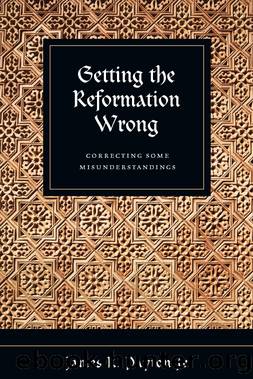Getting the Reformation Wrong: Correcting Some Misunderstandings by James R. Payton Jr

Author:James R. Payton Jr. [Payton Jr., James R.]
Language: eng
Format: epub
Publisher: InterVarsity Press
Published: 2010-07-01T16:00:00+00:00
Conclusion
Sola scriptura was the formal principle of the Reformation. The Reformers all held to it. But the Reformers did not intend by that phrase to claim that Scripture was the only religious authority; rather, they uniformly held it to be the supreme authority. It stood alone as the only unquestioned authority. The Reformers had tested the other claimants to religious authority and found them all wanting. Some failed miserablyâpronouncements of the universitiesâ scholastic theological faculties, papal declarations and canon lawâand were discarded. But all the Protestant Reformers looked with respect and admiration on Christian antiquityâspecifically on the church fathers, the ancient creeds and the doctrinal decrees of the ecumenical councilsâand acknowledged a subordinate religious authority inhering in them.
The Protestant Reformers would not allow that any of these ancient worthies could initiate truth on their own: that was the prerogative of Scripture alone, which was the touchstone of all Christian teaching. If any church father defaulted in humility before a faithful exposition of scriptural truth, that writing or father could be dismissed from consideration. But in the main, the church fathers served as faithful witnesses of Christian teaching. The church fathers, with the ancient creeds which served to encapsulate Scriptureâs teaching on the one hand, and the ecumenical councils which defended that teaching against heresy and found ways to confess it responsibly on the other, constituted a subordinate religious authority for Christian teaching.
This did not mean that the Reformers expected all believers to be knowledgeable in Christian antiquity and its written monuments. Not surprisingly, the various Reformers differed in how extensively they read in patristic literature and referred to it in their own writings. Even so, they all acknowledged the church fathers, the ancient creeds and the doctrinal decrees of the ecumenical councils as subsidiary religious authorities, beneath and as approved by Scripture.
What this boils down to is that for the Protestant Reformers sola scriptura did not mean that the written Word of God is the only religious authority; rather, it is the only unquestioned religious authority. Scripture stands at the summit of religious authority with no rivals. Any other supposed or alleged religious authority is judged by it; most fail to measure up. The only ones that pass muster in this regard, and so the only ones in which a subordinate religious authority inheres, are the church fathers, the ancient creeds and the doctrinal decrees of the ecumenical councils. They are indeed subordinate to Scripture as religious authorities; but they are nevertheless authoritative. They must not be dispensed with or disregarded.
But what does this mean for contemporary Protestants in the twenty-first century? Does it require members of congregations to be knowledgeable in and able to discourse with insight on these ancient worthies? The Reformers did not expect that of the members of the congregations they served, so they would hardly expect it of others in subsequent centuries. But it does imply that, both in the sixteenth and twenty-first centuries, the faithful must stand with the church fathers, the ancient creeds and the doctrinal decrees of the ecumenical councils.
Download
This site does not store any files on its server. We only index and link to content provided by other sites. Please contact the content providers to delete copyright contents if any and email us, we'll remove relevant links or contents immediately.
The Lost Art of Listening by Michael P. Nichols(7506)
Why I Am Not A Calvinist by Dr. Peter S. Ruckman(4153)
The Rosicrucians by Christopher McIntosh(3521)
Wicca: a guide for the solitary practitioner by Scott Cunningham(3179)
Signature in the Cell: DNA and the Evidence for Intelligent Design by Stephen C. Meyer(3138)
Real Sex by Lauren F. Winner(3024)
The Holy Spirit by Billy Graham(2953)
To Light a Sacred Flame by Silver RavenWolf(2824)
The End of Faith by Sam Harris(2742)
The Gnostic Gospels by Pagels Elaine(2532)
Waking Up by Sam Harris(2461)
Nine Parts of Desire by Geraldine Brooks(2370)
Jesus by Paul Johnson(2363)
Devil, The by Almond Philip C(2333)
The God delusion by Richard Dawkins(2309)
Heavens on Earth by Michael Shermer(2285)
Kundalini by Gopi Krishna(2185)
Chosen by God by R. C. Sproul(2165)
The Nature of Consciousness by Rupert Spira(2108)
